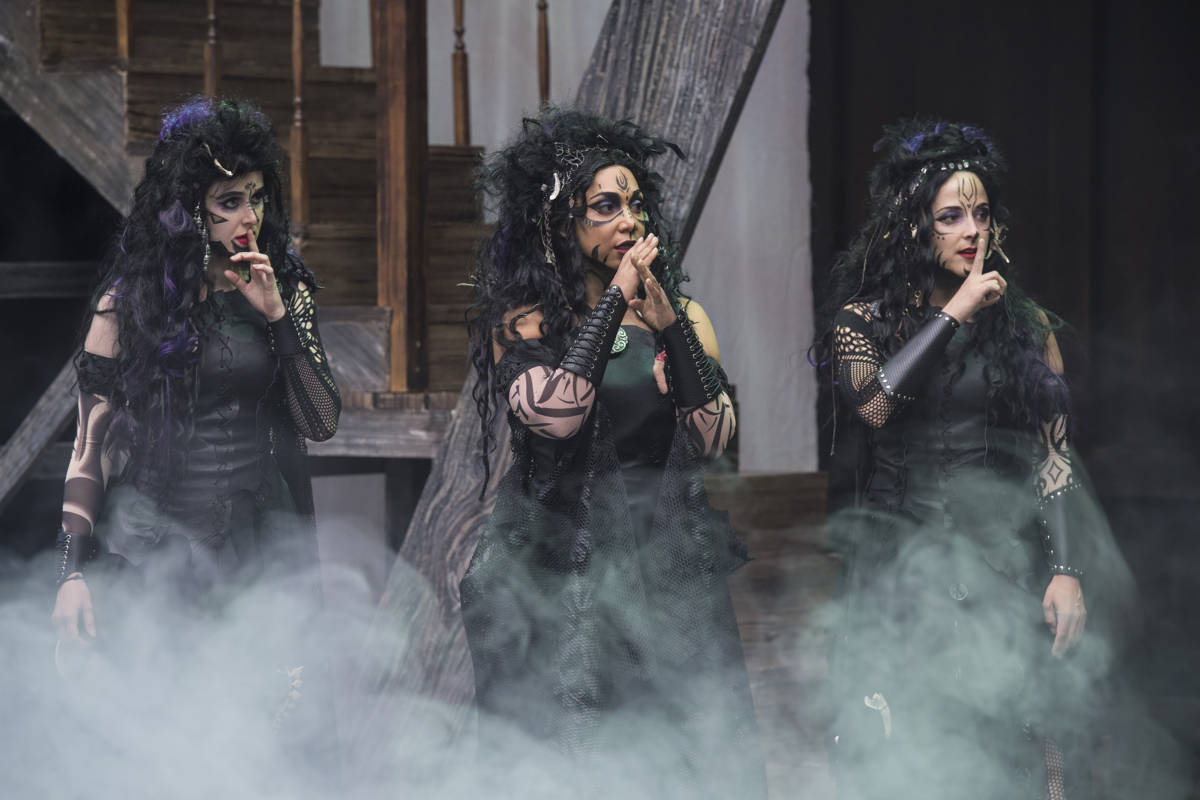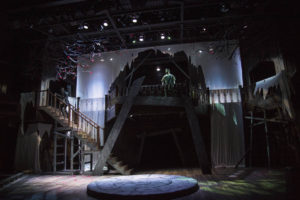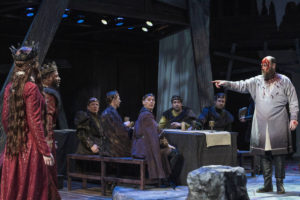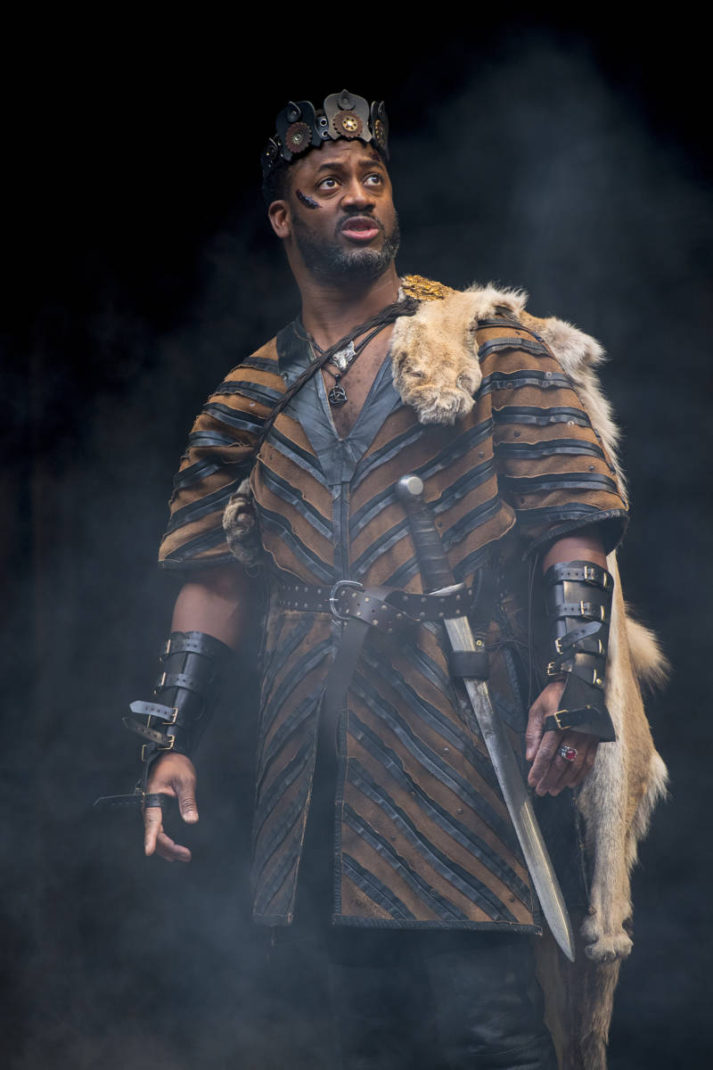
Visionary direction makes for a macabre “Macbeth” at Utah Shakespeare Festival
There’s no question that “Macbeth” can be one of William Shakespeare’s creepiest stories. And the latest production of “The Scottish Play” at the Utah Shakespeare Festival in Cedar City certainly delivers.
Director Melissa Rain Anderson brings a horror film vibe to the production — but not a brainless, screamfest-style horror film. After all, it’s still a classic work of the Bard.
Anderson increases the creepiness through an exploration of four themes throughout: time, nature turned against itself, blood, and children. Anytime you have blood and children together, it’s going to be chilling.
It’s bloody. It’s bold. It’s resolute.
But in Anderson’s macabre vision, the children are not just victims (though Macduff’s wee ones remain the play’s greatest tragedy), they are also the aggressors. In addition to the Weird Sisters — the three witches called for in the script — Anderson adds three child witches to the mix, allowing them to lurk in the background during various scenes. Super creepy.
Still, the Weird Sisters are highlights, as usual. This trio is especially captivating thanks to David Kay Mickelsen’s gothic costuming that recalls Bellatrix Lestrange from the Harry Potter films — a perfect pairing for their physical movements as they swiftly slink onto the stage and later crawl out an open pit. Of the three, Sarah Hollis best inhabits the role — a terrifying vision clad in Mickelsen’s striking designs.

It all takes place in front of Apollo Mark Weaver’s darkly gorgeous scenic design, which features torn white draperies and gray, skeleton-like tree branches tipped with red leaves. The leaves are among the bright red accents used throughout the play, layering another dimension to Anderson’s exploration of the blood theme. They even fall intermittently like drops of blood.
The audience’s vision is drawn to each corner of the set as Anderson deftly moves her actors about the stage, blocking them in such a way that makes you wonder what they are doing and adding to the suspense and mystery. Enhancing this is Lindsay Jones’ spine-chilling music and sound design, covering everything from wolf howls to a deep, echoing knock that launches hearts into throats.

As Lady Macbeth, Katie Cunningham is stellar. She delivers some of the play’s most famous lines (“Unsex me here …”) with power and authenticity. Her sleepwalking scene is particularly noteworthy as she collapses in sobs that reverberate throughout her body.
Prior to that scene, on the night of the first murder, Mickelsen smartly dresses Cunningham in stark white nightclothes that not only match the torn draperies but also offset the bright red blood on her hands.
Another standout is Todd Denning (fantastic in both “Twelfth Night” and “The Book of Will” this season) as Banquo. But his best parts come after he’s dead. The scene of him appearing at dinner is one of the most chilling things to ever appear on the stages of the Utah Shakespeare Festival. Bravo, Anderson, for this ingenious scene.

A surprise performance is Armin Shimerman (also superb as Polonius in “Hamlet” this season), whose Butler character delivers some much needed post-murder laughs.
It’s no surprise, though, that the only actor on stage that rivals Cunningham’s Lady Macbeth is Michael Elich as Macduff. In recent seasons, Elich has proved himself as one of the most talented actors to grace the USF stages, and he continues to slay his roles this year. Of all his scenes, though, Macduff’s grief upon learning of his murdered family is a thing of terrible beauty — a heartbreaking mixture of anger and fragility.
And what of Macbeth himself? Wayne T. Carr’s performance as the titular wicked one is steady throughout, doing a notably fine job with the “sound and fury” speech. And his final fight with Elich, as Macduff, is unexpectedly physical as they actually grapple on the stage.

The only real complaint for this production was the use of a microphone for one of the witches. Initially, it seemed as though it might be for a vocal effect, but it really just sounded like a standard microphone that had been poorly placed, creating a distracting muffled noise.
Unfortunately, one of the most memorable moments of the July 4 showing of “Macbeth” is unlikely to repeat. Due to its staging in the outdoor Engelstad Shakespeare Theatre on Independence Day, fireworks could be heard throughout. But they began in earnest just as the Weird Sisters finished their famous spell and acknowledged the approach of Macbeth with that famous line: “Something wicked this way comes.”
It’s one of those live theater moments that just can’t be planned, though Anderson is enough of a visionary to try. It’s worth noting here that she is one of five women directing productions at the Utah Shakespeare Festival this year (including “The Greenshow”). Because of the nature of Shakespeare’s plays — all written for entirely male casts more than 400 years ago — it’s difficult to get a lot of women on stage, but it’s nice to see the festival making an effort to bring in women as directors, especially when they are as talented as Anderson.
All in all, she has created a “Macbeth” that easily checks off each box for what is expected of The Scottish Play, and then some. It’s bloody. It’s bold. It’s resolute.
The Utah Shakespeare Festival’s production of “Macbeth” continues through Sept. 6 in the Engelstad Shakespeare Theatre at Southern Utah University’s Beverley Center for the Arts in Cedar City. Tickets are $20–$77. Visit bard.org or call (800) 752-9849.
Articles related to “Visionary direction makes for a macabre ‘Macbeth’ at Utah Shakespeare Festival”
Utah Shakespeare Festival’s “An Iliad” is a powerful rumination on the nature of war
Charm, inside jokes minimize the tired tropes in “The Liar” at Utah Shakespeare Festival
Utah Shakespeare Festival’s “Henry VI, Part One” is flawed, but Joan of Arc sizzles



